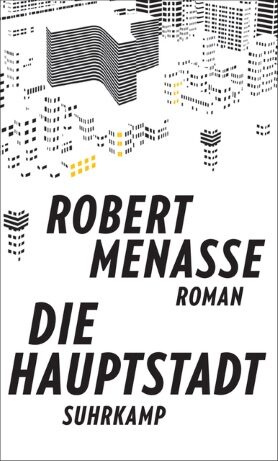Robert Menasse
Die Hauptstadt
[The Capital]
- Suhrkamp Verlag
- Berlin 2017
- ISBN 978-3-518-42758-3
- 459 Pages
- Publisher’s contact details
Robert Menasse
Die Hauptstadt
[The Capital]
Sample translations
Slapstick, Tragedy and Europe
After years of doing research in Brussels, the author found a form of representation reminiscent of Robert Altman's classic episodic film, "Short Cuts:" rather than concentrating on a single protagonist, he mirrors the multi-headed institution by focusing on a number of ‘players’ in Brussels’ labyrinthic organization, who meet by chance or plan, forge alliances, battle one another and engage in intrigues. Everybody is pursuing their own narrow-minded interests, in fact, there is no common ground for anybody to truly relate and therein lies the satirical hyperbole that makes Robert Menasse's portrait of the EU such a thoroughly enjoyable read.
An upcoming major event—the round anniversary of the founding of the EU—kicks off the merry-go-round of activity. Fenia Xenopoulou, the Cypriot Head of the Directorate-General for Culture, calls for original proposals for the ‘Big Jubilee Project’. While on a business trip to Poland, her Austrian consultant Martin Susman, son of a pig farmer and brother of a pig lobbyist, comes up with the idea of making Auschwitz the center of the festivities: the site of Germany’s crimes against humanity—the ultimate symbol of "never again"—should serve as a reminder to overcome nationalistic sentiments and individual state interests.
This macabre and curious constellation becomes the motor of a campaign that Menasse portrays with a keenly analytic knowledge of history and a brilliant sense of comedy. A stray pig wandering the streets of Brussels kicks off the action and appears throughout the story as a vivid and powerful running gag.
Caught in the mill of the morally charged, endlessly debated Babylonian handling of the project are a Holocaust survivor, who was taken to an old age home in Brussels, and an emeritus of economics, who wants to build the ideal "Capital of Europe" on the Auschwitz site. Both of their paths cross at the military cemetery, where the resistance fighter Brunfaut has been buried. He is the grandfather of a criminal investigator, who discovers a Vatican conspiracy in the midst of solving a murder case.
Menasse masterfully holds the strings of all these wild connections, while drawing a complex moral picture in which slapstick and tragedy blend vertiginously with the earnestness of the European vision and lampooning its dismantling. Beneath it all is a subtle and ingenious reflection of another great European epic, "Man without Qualities," Robert Musil’s swan song to the Austro-Hungarian monarchy - a portent for the EU that hopefully will remain fiction.
Translated by Zaia Alexander

By Kristina Maidt-Zinke
Kristina Maidt-Zinke is a book and music critic at the Süddeutsche Zeitung and also writes reviews for Die Zeit.
Publisher's Summary
Brussels. A panorama of tragic heroes, manipulative losers, involuntary accomplices. In his new novel, Robert Menasse spans a narrative arc between the times, the nations, the inevitable and the irony of fate, between petty bureaucracy and big emotions.
Fenia Xenapoulou is facing a career setback. She has been »promoted« to the Department of Culture by the Directorate General – no budget, no power, no reputation. So the »Big Jubilee Project« comes just at the right time for her: she is to revamp the boring image of the European Commission. Her Austrian personal assistant Martin Susmann suggests proclaiming Auschwitz as the birthplace of the European Commission. Fenia is thrilled, but she didn’t take the other European nations into account. Austria: a Polish camp could not be misused to question the Austrian nation. Poland: Auschwitz is a German problem. Germany: Islam, by now a part of Germany, had nothing to do with Auschwitz. What’s more, Fenia can’t count on David de Vriend, one of the last living witnesses, any longer: he runs to the metro station Maalbeek at the wrong time.
Inspector Brunfaut is in a difficult situation as well. He is supposed to leave a murder case covered up at the highest level at rest. But luckily he is friends with the chief computer scientists of the Brussels Police Department, who can gain access to the secret files of the public prosecutor‘s office. Matek, the Polish hitman, knows nothing of this when he makes his escape. But he does know that he shot the wrong guy. That’s not nothing to Matek. He would rather have become ordained a priest; the fact that he had to follow his father’s and grandfather’s footsteps in becoming a "soldier of Christ", doesn’t really make him happy. And yes, there are others who are unhappy as well: the pig farmers who take to the streets with pitchforks in protest of the existing trade restrictions blocking the profitable export of pigs’ ears to China.
(Text: Suhrkamp Verlag)
